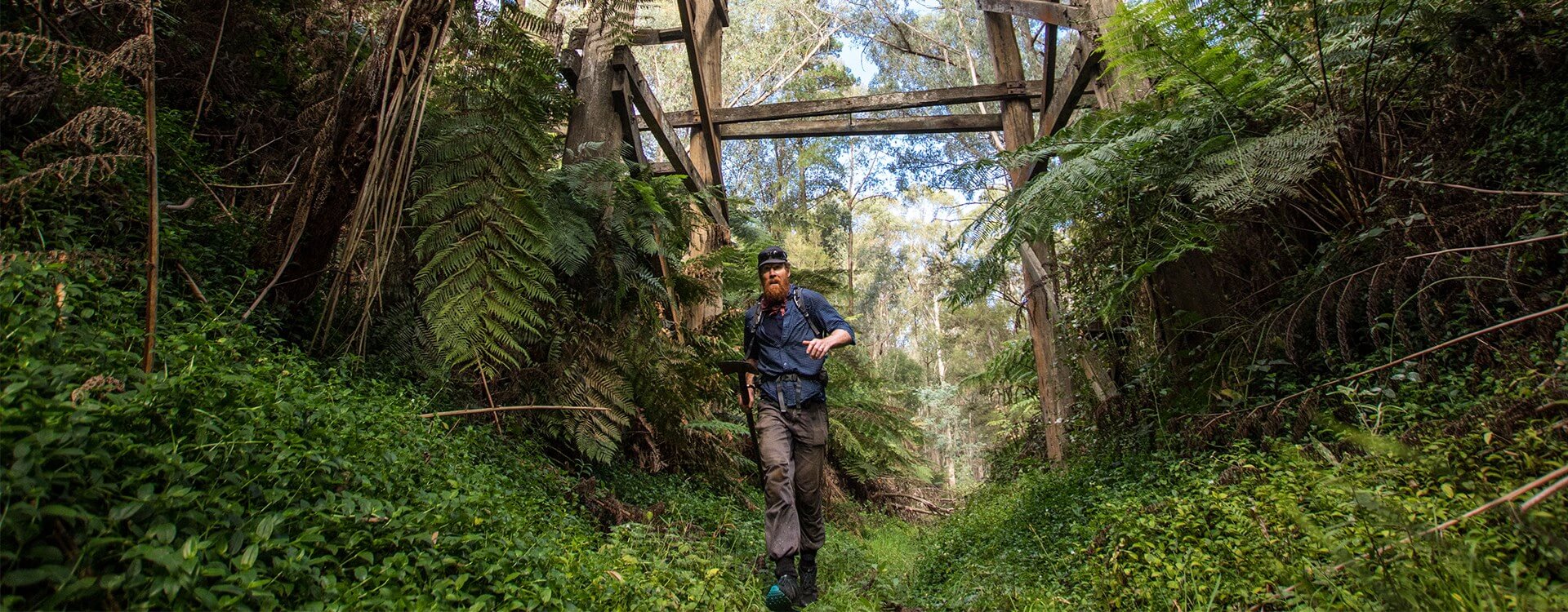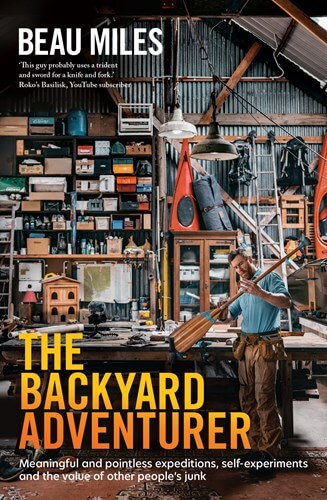Highlights
Table of Contents
Explore article topics
Hopefully, by now, you’re familiar with Australian YouTuber Beau Miles. Recently, we took a look at what makes his channel so good and why we love to watch and now, we’ve been fortunate enough to catch up with him and dive a bit deeper into his thoughts on storytelling, the future of YouTube and how he makes his films. When we say “Australian YouTuber,” it’s safe to say that it’s a little more complex than that…
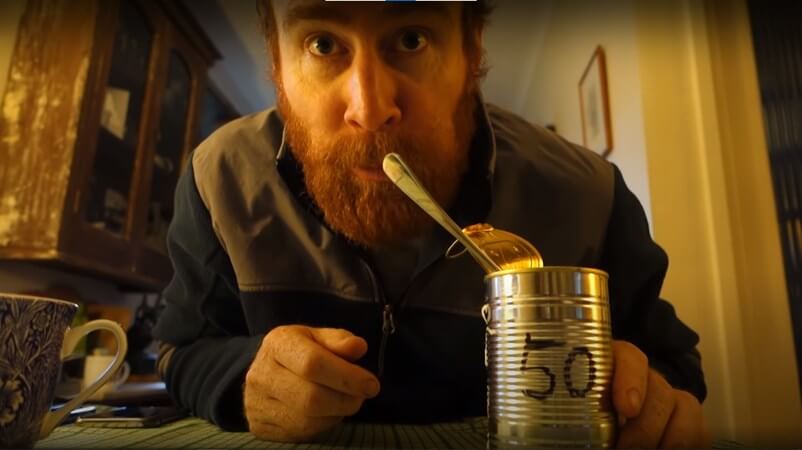
Image taken from ‘The Human Bean: 40 Days on a Tin-Bean Diet’
Let’s start with the basics – who are you, what do you do?
“That seems like a simple question, but…well, the name thing is―it’s Beau Miles. I’m a YouTuber and a writer, but what I do? I’m not sure.”
“I mean, I think it’s fairly multifaceted in that it’s lots of nothing and sometimes lots of pointed things. I try to be good at lots of things and not necessarily an expert at anything, which is harder than it sounds. Because being lots of things often means you’re not sure what you’re doing, what you’re doing it for or what the story might be behind it.”
“I haven’t been overseas for a few years now because of the lockdown nature of the world, but if I’m to go on a plane again and then come back to Australia, on my incoming passenger card, I would probably say storyteller or dad, or bad storyteller…something along those lines. Parent/storyteller.”
At the heart of every one of your films is a good story. It’s engrossing; it draws you in, it gets you thinking. I know you’ve got your favorites in John Steinbeck, a couple of his novels. In your view, what do you think makes a great storyteller?
“For me, the hardest part of any story is to surprise your audience. Be it a watcher or a listener, or a feeler, I suppose. I find the only way I can surprise an audience is if I’m constantly surprising myself, and I’m not quite sure what’s happening. So, as you can imagine, as a small film crew of 3 or 4, it’s infuriating for the others because they’re not sure what’s going to happen next. Where’s Beau going to go, when’s he going to pop out, what’s he going to say, is he going to say the right things? I need that because, otherwise, I’m just not engaged if I think it’s a script. I don’t want to follow a script. I envy people that do so much of one thing, and they kind of know what’s going to happen.”
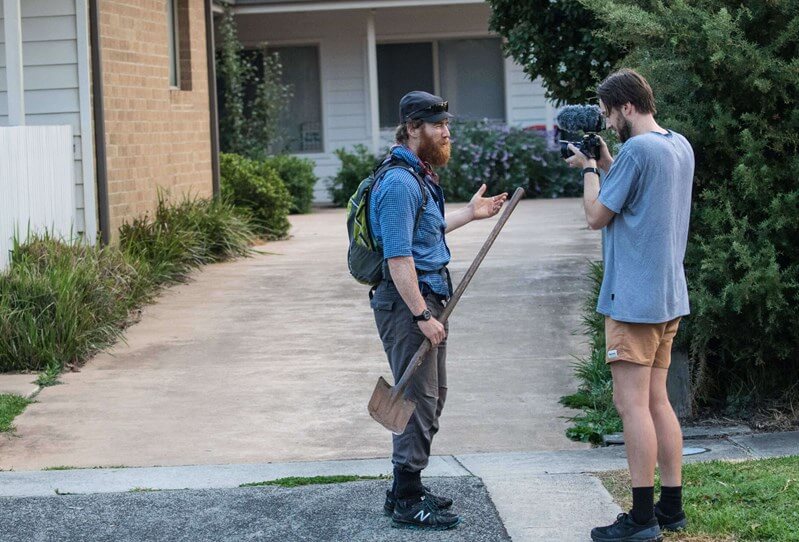
Credit: Chris Ord
So if I’m talking about a book or a film, I just want to be constantly surprised, and I also want to see insight. You know, tell me the most mundane story but do it with interest, do it with creativity, and I’m interested. So yeah, for me they’re the golden rules for a good storyteller. They must surprise me, and they must show me insight.
Beau is a real fan of Steinbeck, and one particular scene from Tortilla Flat inspired his film ‘The Human Bean’. In terms of surprising himself not knowing what will happen next and the insights gained from such an experiment, this one ticks all the boxes.
It’s just trial by fire and trying to find the essence of what is really going on here.
Are there other filmmakers and storytellers that have had an impact on the work you create? Are there certain elements that have made their way into your work?
“If I’m to go right back to being a boy, the first author where my imagination really started to run wild was Roald Dahl. When I started reading his books, his expert storytelling got me into an imaginative world, but I imagine he did that for every second kid who read his books.”
“And then, of course, you think movie stars are the heroes of the world because they tell these stories or show these characters that are so incredible – flawed, heroic, strong or whatever. As an adult, I’ve now moved towards writers and directors, and where they get their creative vision from. People like Steve Soderbergh and Wes Anderson who write slick, creative or ‘weird’ films. I think they’re just great.”
“But to really pinpoint it, they all become a bit of a melting pot for me, I suppose. Whenever someone asks me, or I ask myself, about my favorite ever film, it’s a hard question or a stupid question in some respects. Having said that, I can say Sofia Coppola’s Lost In Translation on my favorites list. It’s a beautiful film because of excellent writing, excellent acting, a beautiful film score, and it’s simple. You know, it’s a very simple story, but it’s also very complex. So when you see such a great story told with such a simple premise – it was shot within a couple of weeks in Tokyo, I think – that really appeals to me as a bootleg YouTuber these days.”
Sofia Coppola’s Lost in Translation stars the enigmatic Bill Murray and a young up-and-coming Scarlett Johansson. It tells the story of a faded movie star and a neglected young woman who form an unlikely bond after crossing paths in Tokyo. It’s a classic, and you can check out the trailer here:
Are you versed in storytelling techniques like the 3-act structure, etc.? Did you ever get an education on this sort of stuff, or is it much more of a natural thing?
“I think it’s more of a progression. I’ve had no formal training whatsoever, a bit like Tarantino. He did his training working in a Blockbuster video store. In some respects, you can copy the greats out there quite easily in terms of their structure. It’s comes down to you trusting yourself with a story. You’ve got to go out there and bloody do it and really live it. And that takes time. That takes a lot of time, and it’s not easy.”
“It hasn’t come easy for me, and if it looks like it has come easy or I’m an “expert” storyteller at my current stage… 1) I’m not sure I am, I don’t think I am, and 2) it hasn’t come easy. It’s just trial by fire and trying to find the essence of what is really going on here.”
Were you always working with a team or has that developed over time? Because it seems to me that having these brilliant, talented extra pairs of hands covering the filmmaking stuff allows you to really focus on the task at hand. Because some of these adventures you’re doing are so physically and mentally demanding, it’s almost like you wouldn’t have enough bandwidth to think about the film and doing the activity at the same time.
“Absolutely. There’s some of me that always wants to go back to the idea of just Beau coming up with an idea, shooting it, editing it and putting it out there. I did that with Africa (Africa by Kayak). I didn’t do the editing for Africa, but I shot the whole thing, but that was exhausting in a sense. When you’ve paddled 50km down the coastline into a headwind, and then you’ve got to tell the story on camera and get the focus right, and then you’re not sure there’s enough battery…it takes a long time. It takes a lot out of you.”
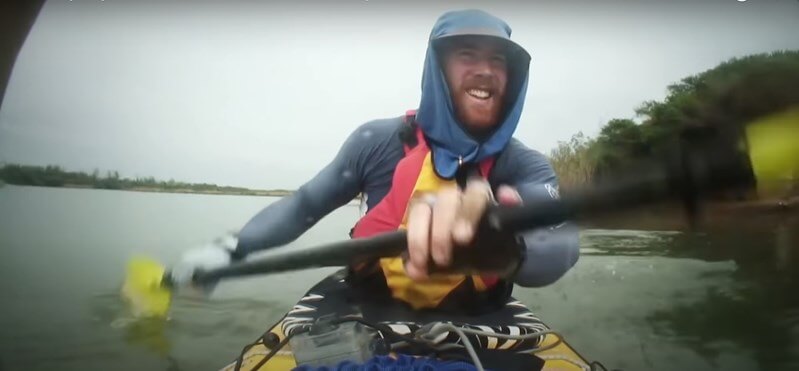
Image taken from ‘Africa by Kayak: 2000km Around the Southern Tips of Africa’
“So I’ve now morphed into this small team, and we’re trying to stay small. You can get caught in the trap of going to an 8 or a 10 person team, but it reaches a complexity that I don’t find appealing. So I’ve got to sort of hold back and come back to the foundations of being nimble and quick.”
“I’ve got a really good filmmaking buddy now – Mitch Drummond. He’s the editor, producer; he does everything! And then we’ve got our contractors who come in a couple of days a week or to help on projects, and it’s really good. It’s a select workforce and the best kind of filmmaking. I hope it stays this way.”
Africa by Kayak – the video Beau is referencing here – is the perfect example of his early solo-filmmaking days. You can imagine paddling 2,000km around the African continent was already pretty tough, but to add on the task of making a compelling film and storytelling throughout? It’s an impressive feat.
So, talking about YouTube…more, bigger and higher-quality productions are looking at YouTube as the way to go. Did you or your team ever envision that YouTube was the place you’d be sharing your stories – did you think this would be a viable thing?
“No! The best part about that question is that it’s almost like you wake up one morning, and you’re no longer a writer or a filmmaker or a teacher or a guide…you’re a YouTuber. Your career is YouTube. I suppose it’s like being an alcoholic (he laughs). When you admit that you’re an alcoholic, life seems a bit easier, and you can get on with fixing yourself or whatever.”
“Once you admit to yourself you’re a YouTuber, it’s kind of liberating. You think, ‘you know what, I’m just going to do this.’ I think many people who have been filmmakers or storytellers in the past have always wanted to get on broadcast TV or become a maker of films that reach the cinemas. Those sorts of things are becoming harder and harder, but…they’re not necessarily the best medium to tell great stories anymore!”
“So the very idea of this super-inclusive platform where you upload a video, and it can be seen by nearly everyone on the planet’ (except a few, very big countries, mind you) is awesome. Creating your own broadcast channel is at our fingertips. I think that’s liberating, and I must admit I’m becoming a big fan of this YouTube brand. I don’t say that because I’m making a lot of money from it, I say that because I think it works really well.”
How do you see YouTube playing out over the next 20 years, and how do you see your career intersecting with that?
“I’ve thought about that question a lot. It’s a good one in the sense that nobody saw this pandemic hitting us and affecting the globe as it has, so what is the equivalent in the world of online storytellers? How do we future-proof ourselves like perhaps a service station (Australian for ‘gas station’) would? For example, they’re no longer selling as much gas because people are not driving as much…””
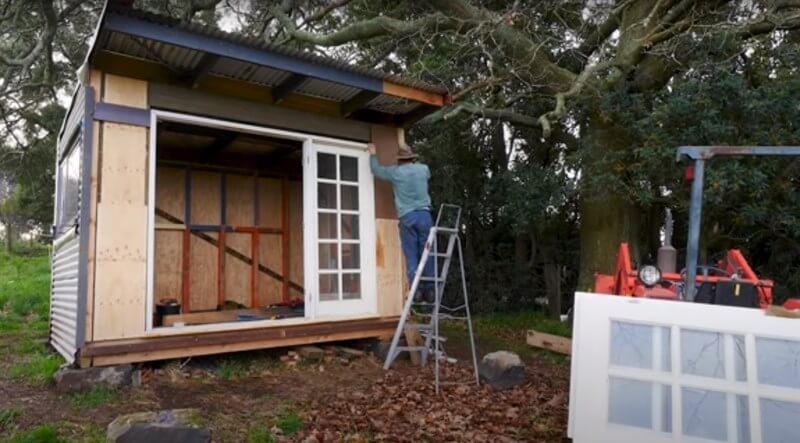
Image taken from ‘Junk Cabin: Secretly building my wife a COVID office’
“In terms of future-proof the visual format, I think we’re pretty safe in the sense that people are going to want to watch this stuff for a long time. How they access it and what they watch it on sure [may change]. But ultimately, I think our medium via a screen is not going anywhere over the next 10 or 20 years, and I haven’t imagined where it’s really going to fragment…but that doesn’t mean I’m right either. I’d like to think of other forms of storytelling that aren’t what we’re doing right now, but I’m not sure what they are.”
I’m finding that a 20-minute film is easier to make than a 5-minute film! I’m really struggling to come through with my 5-minute ideas.
Obviously, we’re seeing an explosion of platforms like TikTok, YouTube Shorts and IG Reels. They’re short form, quick and snappy, maybe 30 seconds to 1 minute long. Yet you’re going for quality over quantity, and you’re producing longer-form content – how has that worked out for you? How do you deal with this idea that the YouTube algorithm is this beast that needs feeding – always demanding more content?
“I’m still coming to grips with how YouTube works. Quality over quantity is the great wrestle in many respects. I see someone like Casey Neistat, who produced a film a day for a year and a half or something. 500 films in 500 days. I have no idea how he did that really, other than not sleep, drink lots of coffee and have a really shitty social life, So you kind of respect that. But, I don’t want to repeat that and nor can I. That’s a superhuman effort!”
“But I don’t want to continue to make 20 to 30-minute films. They’re kind of exhausting, but in some respects, I’m finding that a 20-minute film is easier to make than a 5-minute film! I’m really struggling to come through with my 5-minute ideas. They’re bloody hard – I tend to exaggerate them and make them something more than what the original idea was.”
“You’ve got to really trust yourself with a 5-minute idea, or at least I feel like I do. So I’m not there yet. I don’t really trust myself with 5-minute ideas because I feel like they need more context, more explanation, more nuances, more ‘Beauisms’ (insights and muses from Beau) to make it flourish and to give it the life that it deserves. But I’ve got to break that assumption and try.”
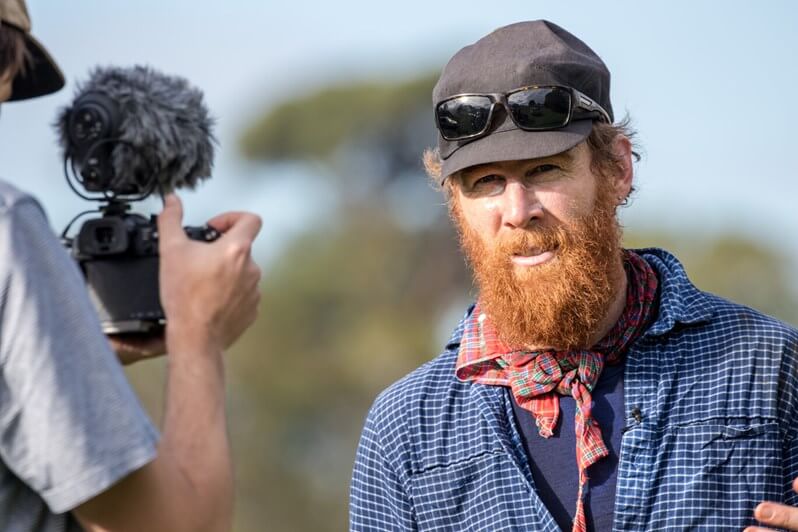
Credit: Chris Ord
“I think my happy medium with Mitch is to make 1 film a month for the next 5 years. That’s what we want to do. And then I’ll see how that goes. How long are those films? That’s the great challenge! As for the quality over quantity question – I don’t have any clear answers for you.”
“I think the last part of that is to really trust your team if you’re with a small team. It might only be 2 people, but if it’s the other person who gives you critical feedback, make sure they’re as harsh as possible. But more than that, getting in a third person who is not part of your core team but who you really trust and who is critical is very important. So we’ll often give our fine cut to a friend of ours, and he’ll take a 30-minute film down to 20 minutes with edit notes in an hour. He can totally see the wood for the trees. So we often meet in the middle, and we make it a 25-minute film. Run the Line was a perfect example of that. We gave him a 30-minute cut, and he took it down to 20 minutes, and we breathed it back out to 25.”
“And I think it needs all of that 25. It would’ve been too lean and too choppy at 20. But we would’ve made it 28 if we hadn’t had his feedback that it’s too long. So that’s really important.”
Run the Line is one of Beau’s most popular films on YouTube and a classic example of how well he and his team work. Throughout, Beau is allowed to get on with the task at hand (running a marathon along an old train line) while the team captures every bit of it. The pacing of the edit and the way the story flows from A to B feels just right. Between you and me, I’d happily watch another hour of an adventure like this!
We do our first cut based on what I say or on what someone else says. It’s all based on voice, and then we put shots to it.
What does the post-production process look like? Are you always in the edit room, or do you sometimes give it to the other guys, and you come in at the end? How does it work for you?
“Each film project is slightly different. Let’s take ‘Junk Cabin’ as an example, where I filmed the whole making of a cabin for my wife on the top of the hill. I filmed that entirely and then just handed the footage off to Mitch, and he did the rough cut. He did a lot of the direction before I came in at the last minute and did 2 or 3 days of fine cuts with him, and then away it went. So, I kind of shot to direct in that sense, and then he became the expert editor.”
“Whereas, if he’s been the Director of Photography like in our latest couple of projects, where he’s across every shot that gets made, and I’m just the ‘doer and sayer’, then I’ll be with him for the whole edit to see what he’s shot and to see myself as the character on screen, rather than as Beau. And I’m getting better at seeing the person on the screen as some dude who I’m just trying to milk the best story from.”
“Our one key piece of advice (and I hate giving advice because I’m crap at it and I don’t like doing it), but we make our films now based on what is said, not what is seen. So, we do our first cut based on what I say or on what someone else says. It’s all based on voice, and then we put shots to it. So that’s our secret weapon. We always go to the voice before the shots.”
Junk Cabin is a simple concept – a beautiful 20-minutes video that whizzes by. It’s an example of how, from time to time and depending on the project, Beau still shoots all of his own stuff. Much like the cabin itself, it’s interesting to see how the edit has been put together and how the story slowly reaches its conclusion.
I can’t believe this kind of music of this quality is available!
How long have you and your team been using Artlist? How would you go about the process of choosing music?
“It used to be that you’d make your film, and you might have a couple of tracks you’ve selected from Artlist. We’ve been with them now for 4 years. We were with a few other platforms before we came across Artlist – recommended by a friend – and boom! We got into it, and [I] thought, ‘Wow, I can’t believe this kind of music of this quality is available!’”
“All my films are collections of mini-stories from A to B, with maybe a powerful 1 or 2 stories in there. Like you mentioned before, it fits the 3-act play kind of thing. But for now, I tend to collect music before we shoot, during shooting and then in the aftermath. As I’m going through Artlist, there’s always 4 or 5 projects in play, and I just plug away the link to that track with the shots, story, mountain or whatever in mind. It makes the edit much easier that way so we can chop it to the music, rather than the other way around.”
“No doubt other directors are just as decisive about it, but it’s a real Tarantino trait, isn’t it? He gets his soundtrack, and he then writes a script to the soundtrack with these shots in mind. There’s no formula for it, but I think I’m much the same in that I often have the experience first – I never have a track in mind when I have an experience, but as soon as I’ve had an experience, and I’m scrolling through listening to music…BANG. I can very easily and quite decisively put those songs to those images. It’s hard, but it’s the fun of filmmaking, too.”
Power your business's creativity with Artlist Business
When you and the team hit upload, that great feeling, what are you hoping to achieve with your films?
“I don’t want to be a people pleaser, and yet it’s very hard not to aim for that on YouTube. You kind of look at how many likes and dislikes you’re getting, knowing that that helps the film’s life and its shareability. I just want to tell stories that I give a damn about.”
“You’re dead right – when you push Publish, it’s pretty fun. I’ve only really done it 20 or 30 times, and I look forward to doing that on a more routine basis where it’s not so exciting in a sense, but rather normal to go ‘bang’ each month, and away you go.”
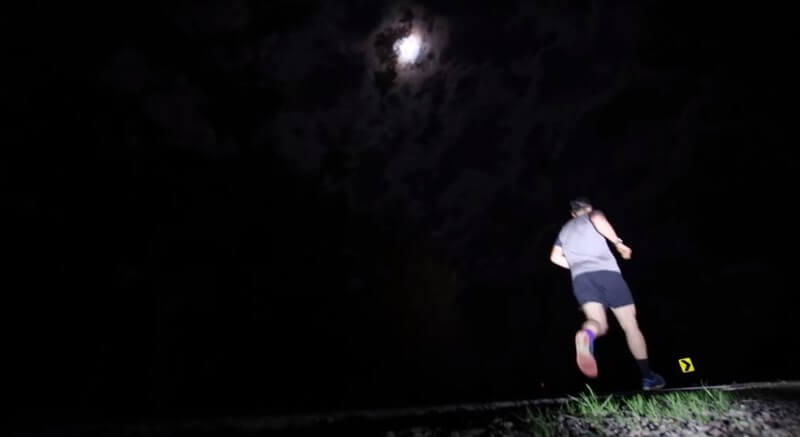
Image taken from ‘A Mile an Hour: Running a Different Kind of Marathon
“I really do like the days in the aftermath – you’re away from the film, and you let it sit. The liberating thing about publishing on YouTube is that you’re happy enough never to touch it again, and you can really move on to the next project. I like that. It’s imperfect, but it’s the best you could do in the time and space you had. After that, you’ve got to move on and do another one.”
You have these funny moments where your plans and your ideas meet the general public. For the most part, people seem to take an interest in what you’re doing, they’re maybe bemused…but there isn’t anything wrong with what you’re doing – it’s just different from what society sees as the norm, so they let you go on your way. How do you think that these adventures and ideas impact people, either in real life or when someone watches on YouTube?
“Without trying to be a people pleaser, I just want to tell a good story that’s fair. I suppose it’s because that’s the best representation of what I’m up to. I’m not very good at advice, or at least I try and stay away from it. I don’t want to write or create a new form of adventure or put ideas in people’s heads. I just want to tell a great story that’s not a waste of time. Very simply.”
“I don’t factor inspiring people into my motivation for doing things. If someone says to me they’re inspired by what I do, that’s a real bonus, and I love it, but I’ve never set out to do that, and I’m constantly trying to understand my ego, and I’m always cautious of being that person that ‘inspires people’. I think that’s a dangerous intention in some respects.”
“You can say I’m quite selfish in why I tell stories, but I think that’s quite liberating and very human, so that’s all I do. I just try and tell a story. There’s an intensity in there that I’m still trying to come to terms with, and I suppose that’s what makes me hungry to keep making stories. Ultimately, I’m in constant pursuit of imperfection, and I think it’s my sense of perfection in some perverse way.”
One of Beau’s most popular films and perhaps one that has unintentionally inspired people the most, A Mile an Hour represents what Beau’s channel is all about. It’s brilliant storytelling and a simple yet unique concept that captivates you from the very start. You can tell that Beau was relishing this one, and he’s doing it simply because he wants to, and he enjoys it. While he doesn’t set out to inspire and influence others, this film shows you that you can have adventures and physical challenges right on your doorstep.
I think that’s part of the channel’s success. Because on YouTube, you really do have to do something different and unique to stand out, right? And that’s occasionally led to some younger people doing ridiculous things that break the law, offend people – just bad stuff. And yet here you are, managing to stay on the right side of all that…
“Yeah, you’ve constantly got to take stock of your moral compass and think, ‘ok, if someone was to go through my backyard, I’d probably want to ask them questions too, like “What are you doing, man? Why are you going through my paddock? (Australian for ‘field’)” If they gave me an answer similar to mine, like “Look, this used to be an old thing through here somewhere, I’m just following it, I won’t be here for long,” and they’re nice about it, I’d instantly realize that that person means no harm and say, “good on ya, keep on going.” That’s quite liberating. So you’ve got to constantly give a genuine impression that you mean no harm. I think people get it.”
“There will always be those people who want to shoot you regardless of your intentions, and I get that also. You’ve got to try and avert that, but sometimes it’s worth the risk!”
Beau isn’t averse to treading (or paddling, or sleeping) where we’re advised not to. In his film ‘The Commute: A Four Day Paddle To Work’, he roams over, under, along and through wherever he needs to make it to work. The film is another challenge to the concepts of adventure and our commutes – an action we often perceive as mundane and never-changing.
Any final thoughts and words?
“A blatant plug for my book! ‘The Backyard Adventurer’ – if you can get it anywhere, somehow. It’s going to be overseas sometime soon. It might not be any good, but you’ve got to go see for yourselves (he laughs). It’s the backstory of all my YouTube films, so I think it’s a really nice compliment. I don’t have a job these days, and YouTube’s not quite there yet, so it helps pay the bills as well. Thanks!”
You can check out Beau’s book here. I’ve read it myself and can confirm, it’s a good’n!
Josh Edwards is an accomplished filmmaker, industry writing veteran, storyteller based in Indonesia (by way of the UK), and industry writer in the Blade Ronner Media Writing Collective. He's passionate about travel and documents adventures and stories through his films.
Share this article
Did you find this article useful?
Related Posts
- By Jessica Peterson
- 17 MIN READ
- By Artlist
- 3 MIN READ
- By Jessica Peterson
- 11 MIN READ
Latest Posts
- 25 Apr
- By Josh Edwards
- 4 MIN READ
